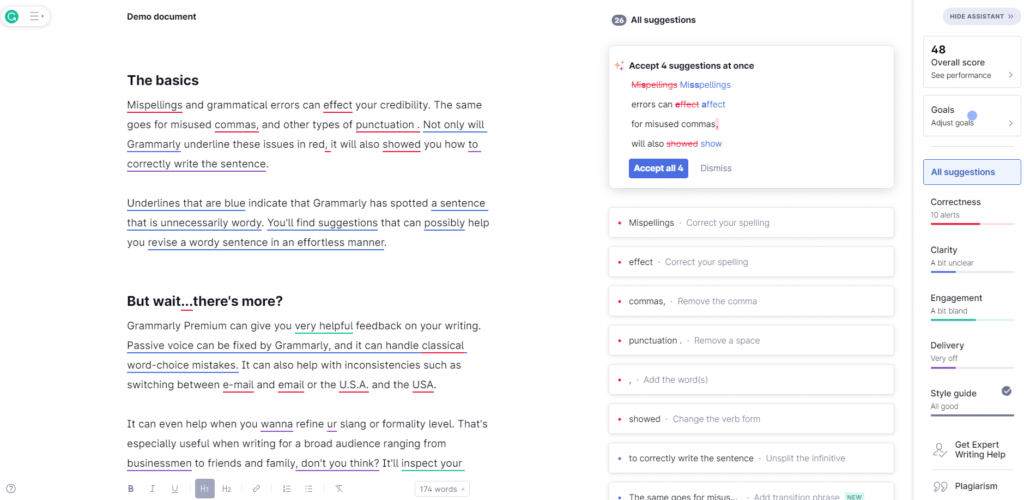How To Write Better: 10 Tips to Improve Your Writing
Published on January 25, 2022 – Last Updated on February 3, 2023
Are you looking to improve your writing skills? Whether you’re a beginner or an experienced writer, these ten tips will help you write better and get the results you want. From improving your grammar to mastering the art of storytelling, these great tips will help you become a better writer.
How to Improve Your Writing Skills?
The first step to developing your writing skills is to read. Read anything and everything that interests you – from novels, short stories, poetry, nonfiction books on topics that interest you, magazines like National Geographic or Smithsonian, which are chock-full of information about the world around us. The more you read, the better writer you will become because reading exposes us to words in context and teaches us how written language sounds when spoken aloud. Reading also gives writers a chance to see what works well in other people’s writing and what doesn’t work so well – it can serve as a model for our own writing.
Next comes practice: write every day if possible; write even if no one will see it or maybe even ever know about it. Writing is a solitary art, and we write for ourselves; we write to connect with our own thoughts and feelings and not necessarily to try and impress others (though it’s nice when people tell us they like something we’ve written).
If you want to fight your writer’s block, sit down at the keyboard or pick up a pen and start writing. There is no substitute for practice, so write about whatever interests you, even if someone has recently written on the same topic. Also, keep a journal of your life – it will be invaluable when you want to recapture a specific time or event in your life.
Check out our Chat GPT ai content creation posts:
- how to use chat gpt
- Chat GPT App for mobile
- chat gpt ai assistant
- chat gpt examples
- chat gpt tutorial
- pregnancy chat gpt
- how to make money with chat gpt
If you want to write on mobile here you can test out these 2 apps: Chat AI iOS & Chat AI Android.
A Few Tips to Improve Writing Skills
- Be direct: Be clear and to the point.
- Ditch modifiers: Delete annoying phrases like “In my opinion,” “really,” “very,” [ too, very much],” or any other modifier that detracts from your writing. An editor would tell you that these words add absolutely nothing of value to your sentence, except for a few extra seconds of reading time, and that’s a crime in writing.
- Avoid words you might stumble over: If there is a word or phrase that trips you up every time you read it, then it has no place in your sentences. It’s as simple as that.
- Choose words wisely: Think carefully about the word you are using to determine how it best fits with the whole sentence.
- Be consistent: Consistency in writing is key, particularly repetition of words. If you use one or two words throughout your piece, then stick to them – don’t suddenly switch to another word without good reason!
- When writing dialogue, try to give your character its own voice: You can do this by making your dialogue sound as realistic as possible, keeping it true to the character, and avoiding clichés.
- Always provide sufficient background information: If you’re writing a historical novel, make sure to include enough information about the time or setting so that your readers will be able to picture
- Short sentences are good, but not in every instance: Try to fit your thoughts into short sentences when appropriate.
- Be concise: Avoid unnecessary words and phrases that add nothing to the meaning of your sentence.
- Please avoid using the same word more than once in one sentence unless it is absolutely necessary. For example, instead of saying, “I went outside for a walk,” you could say, “I decided to go for a walk outside.”

Define Your Writing Style
Do you prefer to write in a formal, traditional style, or would you rather let your sense of humor shine through? It can seem archaic to write in a stiff and formal voice in an increasingly informal world. But there are times when a more approachable tone simply won’t do. For instance, when you’re writing a professional email to your company’s biggest client, it’s best to err on the side of formality. If you’ve been commanded by your supervisor to “be more professional,” one good way is to be more formal in your writing and speaking. But in most other situations, feel free to relax the rules of legal writing and allow a little personality to shine through.
If you’re not sure how formal is too formal, or informal is too informal, check your organization’s style sheet for guidance – the guide listed below the writing section of this article may help – but if there isn’t one, here are some general guidelines:
Formal: Use complete sentences with proper punctuation and capitalization.
Informal: Sentences can be short, especially when writing to someone you are already familiar with.
When in doubt about the appropriateness of a word or phrase, look it up in your dictionary. If you’re unsure which one to use (e.g., affect vs. effect), it’s better to play it safe and choose the more formal word.
Think about your intended audience when you’re trying to decide on a writing style. For example, if you’re addressing an audience of peers or friends, then relaxed grammar rules are often acceptable. But if you’re writing for an academic journal, newspaper, publishing house, government agency, or another professional group, then you should stick to more formal syntax.
In the following sections, I’ll touch on a few different writing styles and how they might be appropriate for particular situations.
Become a Better Writer with Your Own Writing
Writing is a skill that takes time, effort, and practice to master. You can learn a lot about writing to improve your skills, but here are the most important ways you can become better.
Identify your purpose
Before you start writing, it’s essential to determine the message you want to convey. Make sure that your choice of words is appropriate for the audience and reflects the tone you are trying to set. Whether you are writing a professional email or creating a poster for an outdoor event, always be clear and concise in what you want to say. When you are writing academic papers, be sure you’re communicating your own thoughts and ideas in a way that’s easy for the reader to understand.
Do your research
Before starting any piece of writing, it’s essential that you do your research. If your task is to write an essay or term paper, make sure that you have a clear argument and that your points are well supported. If you’re writing business copy, make sure you have checked your facts and relevant information to the reader.
Use The Technology

Technology has had a profound impact on the way people write.
In the past, writers had to rely on pencil and paper to take notes or draft ideas. But with the advent of technology, writers can now use a variety of tools to help them write better.
For instance, they can use software that tracks changes made to a document, which makes it easier to keep track of revisions. They can also use online dictionaries and thesauruses to find the right word for their writing. And if they need inspiration, they can search for writing prompts or ideas online.
Online writing tools and resources can help writers better express themselves and their ideas.
Check out our articles about best writing apps and ai content creation, where we cover topics like academic writing, complex writing, sentence structure, and how to improve your writing skills.
Make Use Of The Outlines
Whether you are writing a blog post or writing professionally for clients, it’s important to create a clear outline before you start writing. Using an outline can help writers organize their thoughts and ideas in a way that is easy for the reader to understand and follow. When you’re using an outline format, always be sure that each part contributes to the overall message of your piece.
Be Specific & Precise
Great writers are precise in their use of words. This means choosing the right word for every situation. But it also requires writers not to make assumptions about their reader’s knowledge or experiences. So even though most readers are familiar with common phrases and expressions, be sure that your writing is appropriate for everyone who might read it.
Use The Active Voice
When you want to emphasize the person or thing doing the action, you should use an active voice.
The prefix “active” means taking action, and it’s also a verb tense. For instance, someone who uses the word “stood” is describing an action that happened sometime in the past. With this definition in mind, here are a few examples of active voice sentences written in the past tense:
Bob ate a chocolate bar.
Tom drove a car across town.
I climbed a tree and jumped into the pool below.
In each of these cases, “Bob,” “Tom,” and “I” are doing something, not being acted on by someone else. In contrast, here are a couple of examples of passive voice sentences written in the past tense:
A chocolate bar was eaten by Bob.
A car was driven across town by Tom.
A tree was climbed, and someone jumped into the pool below.
In each case, “A chocolate bar,” “a car,” and “someone” is doing the action, not “Bob,” “Tom,” or “I.”
Use The Passive Voice
On the other hand, there are some situations where it’s better to use passive voice. One example is when you don’t know who did the action of a sentence. For instance, if you found a wallet and didn’t want to reveal your identity, you might write something like this:
A wallet was found.
In this case, the passive voice is used so that the owner of the wallet won’t know who found it. But when using passive voice, be sure to use a form of “to be” and use “by” after the verb for clarity. For example:
A wallet was found by a man walking his dog down the street.
Eliminate Unnecessary Words
In many cases, shorter sentences can have a greater impact. This is because they are easier for readers to digest and understand than longer ones with complicated structures or layered meanings that require multiple readings in order to grasp all of their elements simultaneously without getting lost along the way like some people do when trying too hard “to sound” authoritative according to often comes across as sounding pretentious rather than professional. This is why the majority of business professionals will keep it simple and write to be understood.
The reason for this rule is not only because by eliminating unnecessary words, you are essentially getting your point across more quickly; it also ensures that readers don’t miss any parts of the message that could potentially alter their initial interpretation. For example, if someone didn’t like the word “utilize,” they might interpret that sentence to mean that you don’t think people should ever use their imaginations.
Eliminate the filler words and phrases
That comes across as nonchalant, like “um” and “ahh.” If you’re trying to say that you’re excited about something, don’t finish your sentence with “kinda.” Don’t use abbreviations or text language either. For example, instead of saying you “wanna” go out with someone, say that you would like to.
Limit the number of prepositional phrases
English teachers commonly teach this lesson in school. However, many adults tend to forget it when they are writing informal emails or letters because they want their message to sound casual and friendly. While it is ok to use a prepositional phrase occasionally, try not to overdo it because it can get distracting. In fact, between certain key phrases and clauses that convey the main idea of a sentence or paragraph, you should typically try to limit yourself to no more than four prepositional phrases.
In addition, when you’re business writing, a prepositional phrase is usually not necessary when you’re trying to convey the meaning of a sentence in as few words as possible. For example:
Instead of saying “The dog is in the house,” which requires two prepositional phrases, say “The dog is inside.”
Create strong verbs
In addition to using the passive voice, try to avoid using weak verbs. For example, instead of saying “I was wondering,” say “I wondered.”
Instead of saying “Abraham Lincoln was born in a log cabin,” say “Abraham Lincoln was born in a log cabin built by his father and grandfather and lived there until he was nearly seven.”
Conclusion
Most writers don’t follow these rules all the time. However, it is helpful when you’re in doubt about whether or not to use passive voice or when you want to shorten your sentence for effect. Even if your content contains some filler words, unneeded prepositional phrases, and weak verbs, you can still benefit from taking advantage of the opportunities that active voice provides to avoid falling back on the passive voice to make up for any shortcomings in your writing.
Conclusion paragraph: In this article, we have given you a few tips to improve your writing skills. You can use these tips in any writing that suits your style and meets your audience’s needs. We hope these points help! What other ways do you think people can become better writers? Let us know in the comments below!







